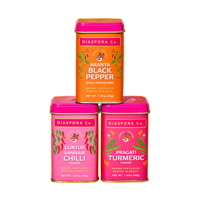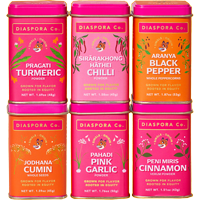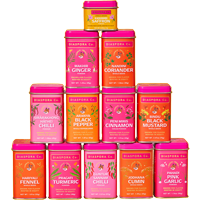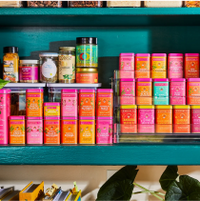
Masala Arbi is an Indian dish made with taro roots, commonly eaten in Punjab. This dish is a dream for all my friends on a vegan and gluten-free diet. For me, it brings back memories of my childhood best friend and I going home after a long day of school and eagerly waiting to eat my mother’s Masala Arbi with fresh parathas. It’s funny how I can feel the taste on my tongue as I reminisce.
With a bit of help from my mom, I was able to recreate this recipe for my daughter, and it quickly became her favorite thing to eat! This Punjabi Masala Arbi is a drier sabzi belonging to the north of India, where spices are cooked in an onion and tomato base. I hope this dish brings you just as much joy as it has brought generations in my family. You can try my family’s version on Shef.com!
- Shef Pooja B.
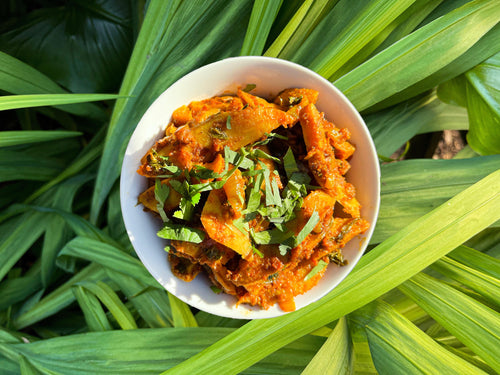
Pooja’s Masala Arbi
Masala Arbi is an Indian dish made with taro roots, commonly eaten in Punjab. This dish is a dream for all my friends on a vegan and gluten-free diet. For me, it brings back memories of my childhood best friend and I going home after a long day of school and eagerly waiting to eat my mother’s Masala Arbi with fresh parathas. It’s funny how I can feel the taste on my tongue as I reminisce.
With a bit of help from my mom, I was able to recreate this recipe for my daughter, and it quickly became her favorite thing to eat! This Punjabi Masala Arbi is a drier sabzi belonging to the north of India, where spices are cooked in an onion and tomato base. I hope this dish brings you just as much joy as it has brought generations in my family. You can try my family’s version on Shef.com!
- Shef Pooja B.
Ingredients
- 2 pounds (24 oz) taro root
- 10 tablespoons olive oil, for frying
- Pinch of asafoetida
- ½ teaspoon Wild Ajwain
- 2 small onions, finely chopped
- 3 large tomatoes, finely chopped
- 1 small green Indian chilli, or ½ serrano pepper, finely chopped
- 3 to 4 teaspoons ground Nandini Coriander
- 1 teaspoon powdered Kashmiri Chillies
- 1 teaspoon mango powder (amchur)
- ½ teaspoon Pragati Turmeric
- ½ teaspoon Jodhana Cumin seeds, roasted then coarsely ground
- Salt, to taste
- Fresh coriander leaves, for garnishing
Methods
-
To prepare the taro root, peel using a paring knife or a vegetable peeler, then cut into the shape of your choice. (I love cutting them into the shape of thick-cut fries, but if your taro is slender, you can also cut them in thick rounds.)
-
Place the cut taro root in a colander and rinse with cold water. Place the rinsed taro on a clean kitchen towel and pat dry.
-
Heat 8 tablespoons olive oil in a large skillet over medium-high heat. Fry the taro root, working in batches, until golden on all sides, about 5 to 6 minutes. Transfer the finished, fried taro to a paper towel-lined plate to drain, and set aside.
-
Discard the oil used for frying the taro, wipe out the pan, and return it to medium-low heat. Add the remaining 2 tablespoons olive oil to the pan and allow to heat for 30 seconds. Add the ajwain and asafoetida and cook until the seeds start to sputter, about another 30 seconds.
-
Add the onions and green chilli, and sauté, stirring occasionally, until the onions become translucent and start to turn deep golden, about 8-10 minutes. Stir in the tomatoes, cover, and cook until they just start to soften and are easily broken apart with the back of a spoon, about 5 minutes.
-
Add the coriander powder, Kashmiri chilli powder, mango powder, turmeric, cumin powder and salt, and stir to combine. Reduce the heat to low and cook, uncovered until gravy thickens and the tomatoes become jammy, about 10 to 15 minutes.
-
Add the reserved fried taro, gently stirring to coat each piece in the masala. Increase the heat to medium and cook, uncovered, until the taro is tender but still retains a bite, about another 10 minutes.
-
Garnish with coriander and serve hot alongside roti or paratha.
![]()
We partnered with Shef to produce this recipe, featuring our spices and their local cooks like Shef Pooja B.
Shef is a community-based homemade food platform for immigrants, refugees, and local cooks to share their cuisine with their neighbors. Shef is dedicated to economic empowerment, meaningful connection, and cultural inclusion. We partnered with Shef to produce this recipe, featuring our spices and their local cooks, like Shef Pooja B. from the Bay Area.




